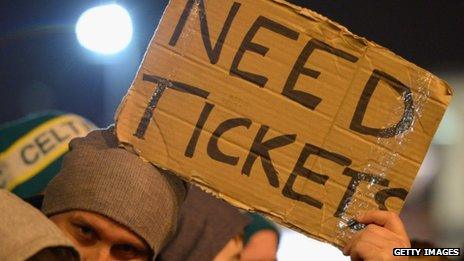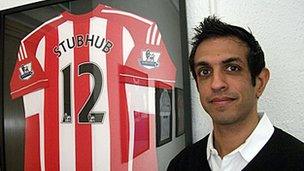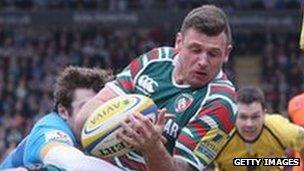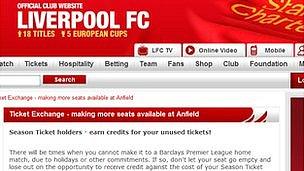Secondary ticketing: Inflating sport prices or useful service?
- Published

A regular problem for football fans on big-match days
It is an exciting time of year to be a UK sports or music fan, with big cup finals and major name concerts coming thick and fast.
From the climax of the European football season and a summer of top-class cricket and tennis events to the Rolling Stones and Who concerts, there never seem to be enough tickets to go round for die-hard followers.
At one time that might have meant hanging around outside a venue hoping to buy off a tout, or someone else with "a spare" to sell.
However, over the past decade a new phenomenon has arrived on the UK's shores - the "secondary ticketing" exchanges that allow individuals, sports clubs, and other organisations to legally sell spare tickets - often, but not necessarily, at more than face value.
Among the biggest names on the internet are Viagogo, Get Me In, Seatwave, and Stubhub, all of whom are keen to highlight that dealing with them is financially secure.
But on the other hand, one sports fan group say we are seeing "legalised touting", and that these firms are able to act in a way that the ordinary fan cannot.
'Safe experience'
Navin Kekane, is business operations director of Stubhub, a major American ticket exchange, and part of the Ebay group of firms. It employs more than 1,000 people in the US, and provides services for buyers and sellers of tickets for sports, concerts, theatre and other live entertainment events.
It launched in the UK in March 2012, and employs about 35 people in the UK and Republic of Ireland, with a physical office in central London and a customer service team based in Dublin.

Stubhub's Navin Kekane has overseen the transfer of Ebay's music concert ticket sales to Stubhub
Stubhub provides a service connecting those with spare tickets to those who want to buy them. Ticket adverts state that "prices are set by sellers and may be higher than face value", with the face value price clearly displayed.
For Everton's game against West Ham at the weekend, there were tickets for sale at both above and below face value.
"What we do is all about supply and demand, and you can find tickets at below face value," says Mr Kekane, adding that "ticket prices often start to fall as an event approaches".
Sellers are charged a 12% fee including VAT and with PayPal fees waived, For buyers booking fees, delivery and VAT are included in the ticket offer price, with no additional costs at checkout.
Sports organisations
The firm has recently moved its music concert listings from Ebay to its own website. Mr Kekane said the move offered extra features not available to ticket sellers using Ebay and that Stubhub was a superior platform for music ticket sales.
And if problems ever arise, he says, Stubhub's ticket-buyer guarantee means "we will do everything we can to get you into that event with an equal or better ticket".
"There is a passion around music and sport and we want to make sure things go right and people get the tickets they have paid for," says Mr Kekane.

Stubhub has signed a number of deals with sports clubs, including Leicester Tigers
"We have good relationships with sports organisations and box offices," he adds, pointing to official relationships with seven organisations in the UK, including three Premier League clubs, Leicester Tigers rugby union club, the Lawn Tennis Association, Jockey Club, and concert promoter AEG.
In the UK the resale of football tickets is illegal under section 166 of the Criminal Justice and Public Order Act 1994, unless the resale is authorised by the organiser of the match. Stubhub currently has deals with Sunderland, Everton, and from next season, Tottenham Hotspur.
Rival Viagogo has deals with Aston Villa, Chelsea, Fulham, Manchester City, Newcastle United, QPR, West Bromwich Albion, West Ham United, Wigan and Reading.
'Legalised touting'
"At the moment if you are a fan trying to sell a spare ticket and are not authorised to do so, then you face a criminal conviction, even if you sell it at face value," says Malcolm Clarke, who has been chairman of the Football Supporters Federation (FSF) since it was founded in 2002.
"But secondary ticketing exchanges, because they are authorised, are allowed to do it. Many clubs grant these these agencies the right to allow re-sell of tickets for their matches at above face value. I don't think that can be right."
Mr Clarke recognises ticket exchanges offer some financial security not found in more informal online ticket trading.
"I suppose if you do buy a ticket from one of these exchanges and did not get it, then you would have some comeback, and I do know there have been horror stories about people being cheated by unauthorised ticket sites on the internet," he says.
"But in one-to-one physical transactions I have never heard of the ticket seller grabbing someone's money and running off, and I do not think the actions of these exchanges are justified."
He says more clubs should look at setting up their own ticket exchanges, as Liverpool and Arsenal have done.

The FSF would like to see more big clubs launch their own ticket exchanges, as Liverpool has done
"I don't think it would be too hard to organise such a scheme, for returning unsold tickets from your fans for other supporters to buy," he says.
"These [clubs] are big organisations and in these days of high technology I don't think it would be too difficult for them to run [resale] schemes themselves. It is sheer laziness on the part of the clubs - they prefer to see it as a problem and hand it over to someone else."
Despite such resistance to the idea of secondary ticketing, Mr Kekane believes the market will continue to grow in the UK as consumers become more accustomed to the concept, launched in the US more than a decade ago.
And he points out that his firm does not itself actually buy or sell tickets.
"We do not buy up huge stashes of tickets looking to sell them on - Stubhub does not own, price or sell any tickets on the site".